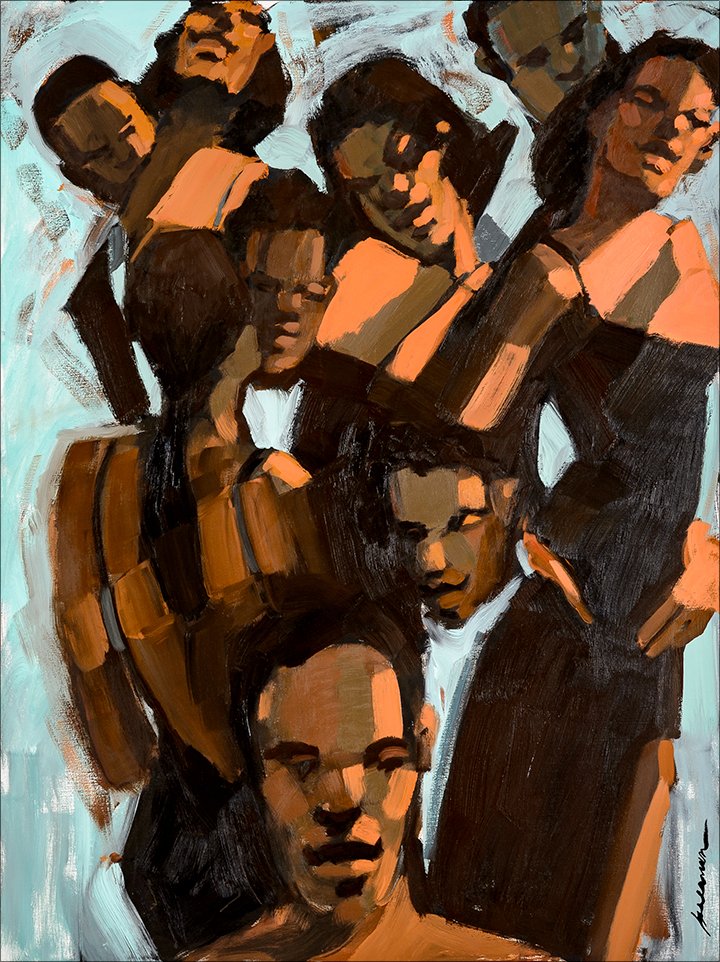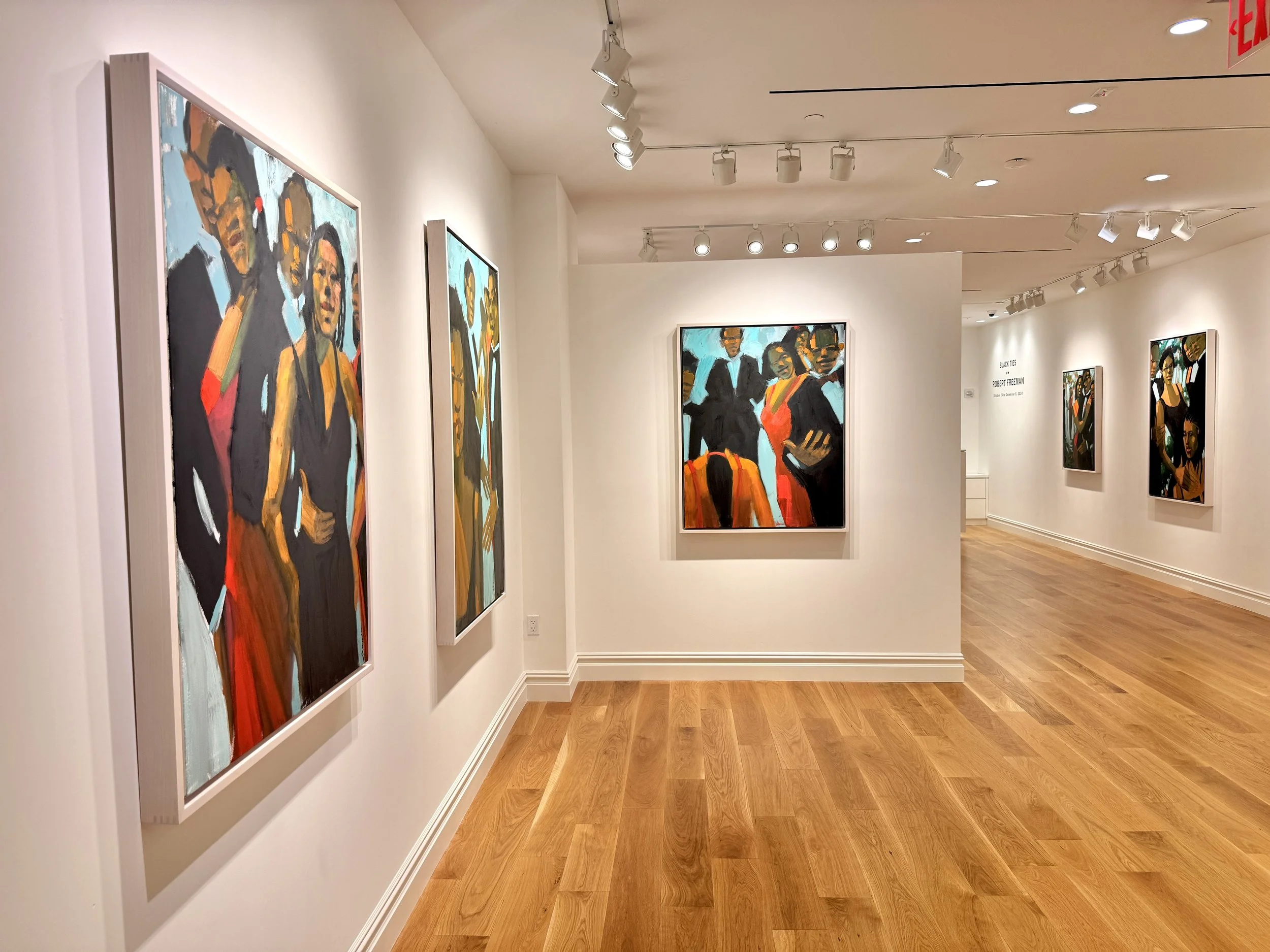Robert Freeman: Black Ties
October 24 - December 6, 2024
Black Ties marks Freeman’s first solo exhibition at our New York gallery, following two shows at our former Boston location. The exhibition will run from October 24 to December 6, 2024.
Adelson Galleries New York
The Fuller Building
595 Madison Avenue, 4th Floor
New York, NY 10022
(212) 439-6800
Robert Freeman, Party Lines, 2016, Oil on canvas, 56 x 42 inches
Robert Freeman
Black Ties
October 24 – December 6, 2024
Robert Freeman is celebrated for his oil paintings depicting the jubilant social lives of the Black diaspora middle class. His gestural brush strokes, bold use of color, and layered paint application create vibrant scenes that toe the line between figurative and abstract. These dynamic compositions reflect the artist’s internal conflicts with the role of race in America and Black culture. They explore the distinctions of his experience as a child in Ghana and as an adult navigating the complex social dynamics within the African American community. Freeman employs a literary approach to painting, allowing the characters in each work to reveal their personalities to him and develop a narrative of their own.
Robert Freeman was born in New York City in 1946 and lived on the East Coast until 1955 when his father relocated the family to the Gold Coast of West Africa. Freeman's father worked for Kwame Nkrumah, a revolutionary and politician who led the Gold Coast to independence from Britain in 1957, becoming Ghana's first Prime Minister and President. In Ghana, Freeman grew up seeing Black faces like his own in positions of power, on monuments, and on the new country's currency. This experience fueled a feeling of empowerment in the artist, which he had not felt in America. Freeman spent his formative years between Ghana and Washington D.C., where he graduated from Calvin Coolidge High School in 1965. Freeman recalls his impulse to put pen to paper at a very early age, scribbling free-flowing lines until the entire page was black. His desire to create led him to study under the influential artist Loïs Mailou Jones at Howard University for two years before transferring to Boston University in 1967. Freeman earned a BFA in 1971 and an MFA in 1981 from Boston University, where he had the opportunity to train with renowned artists Reed Kay, Richard Yarde, James Weeks, and John Wilson.
During that time, Freeman studied under Philip Guston. Similar to Guston, Freeman emphasizes shape, color, and movement over technical precision to create a sense of completeness, utilizing thick and heavy brushstrokes that foster a connection with the subject. According to Freeman, “I never explored my personal subject matter until I started graduate school with Philip Guston. He gave me the opportunity to explore what was in my heart and my mind in ways that I had never done before, and it just opened up a world.” After his education, Freeman taught art at several institutions, including Harvard University, where he lectured from 1986-1992.
Despite his impressive resume and unwavering commitment to his practice, Freeman struggled to make headway in the commercial art world during the ‘70s and into the ‘80s as a Black artist. Freeman remembers carrying his canvases from gallery to gallery, only to be told that there was no demand or clientele interested in paintings of this ‘subject matter.’ By 1982, he caught his first break with an exhibition at Chapel Gallery in Newton, MA. The show was comprised of a new series that he called the Social Season, which explored the social lives of middle-class African Americans: a subject that was deeply personal and reflected his sense of alienation within his own community. The show made the front page of the arts section of the Boston Globe and precipitated the sale of his monumental painting “Black Tie” (1981), which was later donated to the Museum of Fine Arts, Boston by the Flather family. Currently, “Black Tie” is on loan: displayed in Governor Maura Healey’s office in the Massachusetts State House.
Robert Freeman’s paintings have continued to be exhibited nationally for over 40 years and included in the collections of the Museum of Fine Arts, Boston, the National Center of Afro-American Artists, Boston Public Library, Brown University, and DeCordova Museum. His paintings have been featured in exhibitions at Rose Art Museum at Brandeis University, Museum of Fine Arts, Boston, and Williams College Museum of Art. Freeman has explored a variety of themes and subject matter throughout his career, including European and regional landscapes, Mardi Gras Indians, American Regatta, and most recently, America’s Past-Time: observations of our country’s current racial divides. Since 1981, Freeman has periodically and compulsively returned to the Social Season series, a subject that continued to resonate and evolve throughout the course of his life.
The compositions of paintings in the Social Season series are intricately layered, showcasing a vibrant interplay of figures that capture the essence of social interaction. The figures are rendered in varying degrees of abstraction, some with more defined features and others with just enough detail to suggest their presence. This blend of abstraction and figuration invites viewers to engage with the paintings on multiple levels, appreciating both the individual characters and the collective atmosphere they create. Freeman's choice to blur the boundaries between the figures and the background adds to the paintings’ dynamic quality. The figures seem to emerge from and recede into the abstract background, symbolizing the fluidity of social interactions and the interconnectedness of the individuals within the scene. Each invite viewers to experience the vibrancy and complexity of the social lives of the Black middle class in America, a community to which the artist belongs yet from which he feels a sense of separation.
Adelson Galleries has represented Robert Freeman since 2016, hosting two exhibitions at our prior Boston location. This exhibition marks our first solo exhibition of Freeman’s work in our New York gallery. The collection of 15 paintings was created over the past eight years and is a continuation of the Social Season series. The paintings explore and celebrate the beauty, elegance, and grace of the Black community. Freeman’s persistence with this subject matter throughout his career demonstrates how deeply personal these paintings are to his identity. More broadly, the theme can be applied to any individual in their quest for a sense of belonging. We hope these paintings will resonate with all who visit the exhibition.






